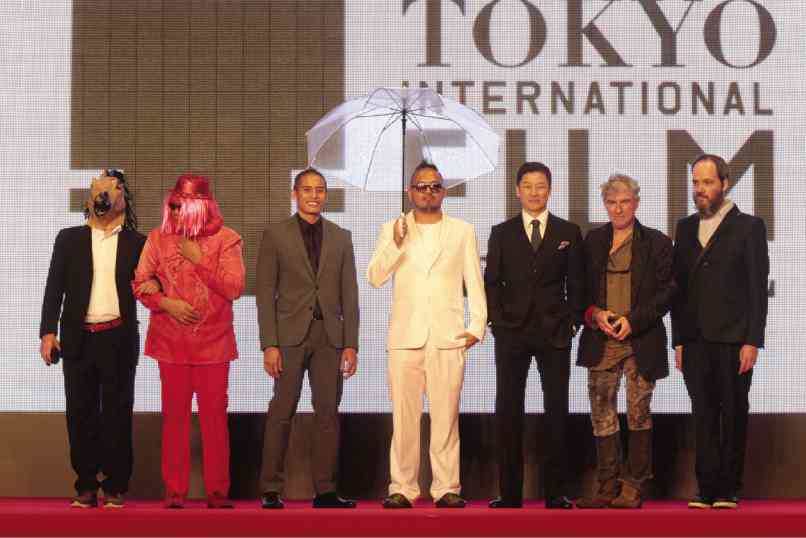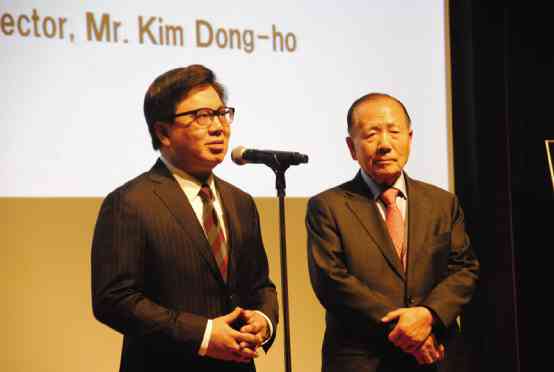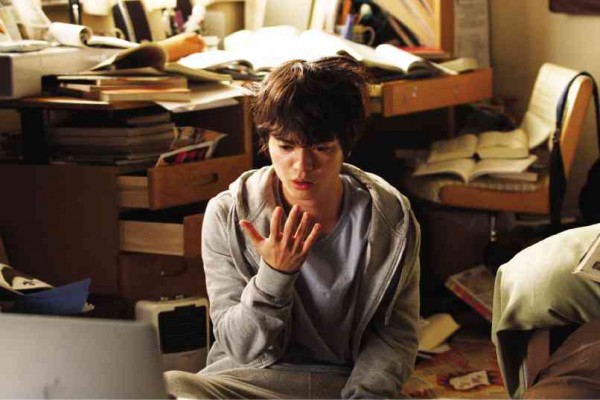No competition among Asian fests

“RUINED Heart” team, led by director Khavn de la Cruz (center), actor Tadanobu Asano (third from right) and cinematographer Christopher Doyle (second from right), on the red carpet of the Tokyo fest TIFF
More than once, the question was raised by reporters who covered the 27th Tokyo International Film Festival, held in Japan last October.
Is Tokyo beefing up its premier film festival because newer and more aggressive Asian festivals like Busan and Hong Kong are making strides in the international circuit?
The Tokyo fest recently bolstered its cache by teaming up with UniJapan and the Japan Foundation (through the Japan Foundation Asia Center), to implement various programs—primarily, the inclusion of more Asian titles in its different sections. Various cultural exchange projects will likewise be undertaken until 2020.
Under the partnership, the foundation will promote exchanges and networking opportunities among different filmmakers in the region.
Tokyo is one of only three Asian fests (along with India’s Goa and China’s Shanghai) included on the list of the Top 14 international film festivals chosen by the Federation of Film Producers Associations.
Article continues after this advertisementDuring the fest’s opening last year, Japan’s Prime Minister Shinzo Abe pointed out that Tokyo serves as the “world’s gateway to Asia,” underlining the importance of “the promotion of cultural exchanges between Japan and other parts of the world, specifically Asia.”
Article continues after this advertisement
HONG Kong’s Wilfred Wong and Busan’s Kim Dong-ho attended the Tokyo fest reception last year. Rolando Samson/Japan Foundation
Memorandum
Recently, the Tokyo fest also signed a memorandum of cooperation with the Shanghai International Film Festival.
Instead of competition, the region’s top film festivals are batting for cooperation, said Yasushi Shiina, director general of the Tokyo fest.
Representatives of two high-profile film fests (Kim Dong-ho, honorary festival director of Busan, and Wilfred Wong, chair of Hong Kong IFF) graced the Tokyo fest’s Asia Network reception held on Oct. 24. The dignitaries’ presence heralded an “unprecedented collaboration among Tokyo, Busan and Hong Kong in the formation of an Asian Film Awards Academy,” said Shiina.
The goal is to develop the Academy into “a professional organization that develops film art and cinematic excellence in Asia.”
Shiina said during the reception: “We have started discussions with our colleagues in Busan and Hong Kong. The Asian Film Awards was held in Hong Kong for the past seven years. It is time to move it around the region.”
Also in the works are annual programs, spearheaded by the Academy, to encourage exchanges among film professionals in the region.
“We have a lot to achieve,” said Shiina. “We can do it with our friends’ support.”
Hiroyasu Ando, president of the Japan Foundation, said: “The Tokyo fest allows us to watch each other’s films. In Asian films, we can see a certain vigor and intimacy.”
Apart from popularizing Japanese films abroad, the Tokyo fest also seeks to introduce Asian films to Japanese audiences, Shiina told the Inquirer.
As part of the fest’s new initiatives, organizers included a new section dubbed “Crosscut Asia,” a retrospective on Asian films, highlighting a specific country. At the 27th Tokyo fest, Thailand was the retro’s focus.
“In a future edition, we can feature Philippine cinema in the retro,” said Kenji Ishizaka, programming director of the Asian Future section which, in turn, spotlights promising young filmmakers from across the region.
As promised, a retrospective of Filipino films, including the works of Brillante Ma. Mendoza, will be featured in the Crosscut Asia section of the 28th Tokyo fest to be held in October.
Dynamism
Ishizaka noted the dynamism of filmmaking in the region. “In Asia, you will find different languages, religions, political systems, but we somehow come together,” Ishizaka told the Inquirer.
Ishizaka took note of the “high quality of films emerging from the Philippines.”
At the 27th Tokyo fest, three Filipino films were in the program: Khavn de la Cruz’s “Ruined Heart: Another Love Story Between a Criminal and a Whore” in the main section, Pepe Diokno’s “Above the Clouds” in the Asian Future competition and Lav Diaz’s “Mula sa Kung Ano ang Noon” in World Features.
“In 2013, a Filipino, Eugene Domingo, won best actress at the Tokyo fest for Jun Robles Lana’s ‘Barber’s Tales,’” Ishizaka recalled. “These Filipino films are independently produced…but have excellent production values.”
As part of its partnership with the Japan Foundation, the Tokyo fest also supported the annual Japanese Film Festival Eiga Sai in Manila, held July 10 to 19 at the Shang Cineplex, Shangri-La Plaza mall, by choosing six of the 11 movies in the lineup, including “Parasyte,” closing film at the Tokyo fest last year.
The Eiga Sai was also held at the Film Development Council of the Philippines Cinematheque in Davao (July 14 to 19) and will move to other venues: Abreeza Davao (July 24 to 26), Ayala Cebu (Aug. 19 to 23) and UP Film Center in Diliman (Aug. 12 to 15).

